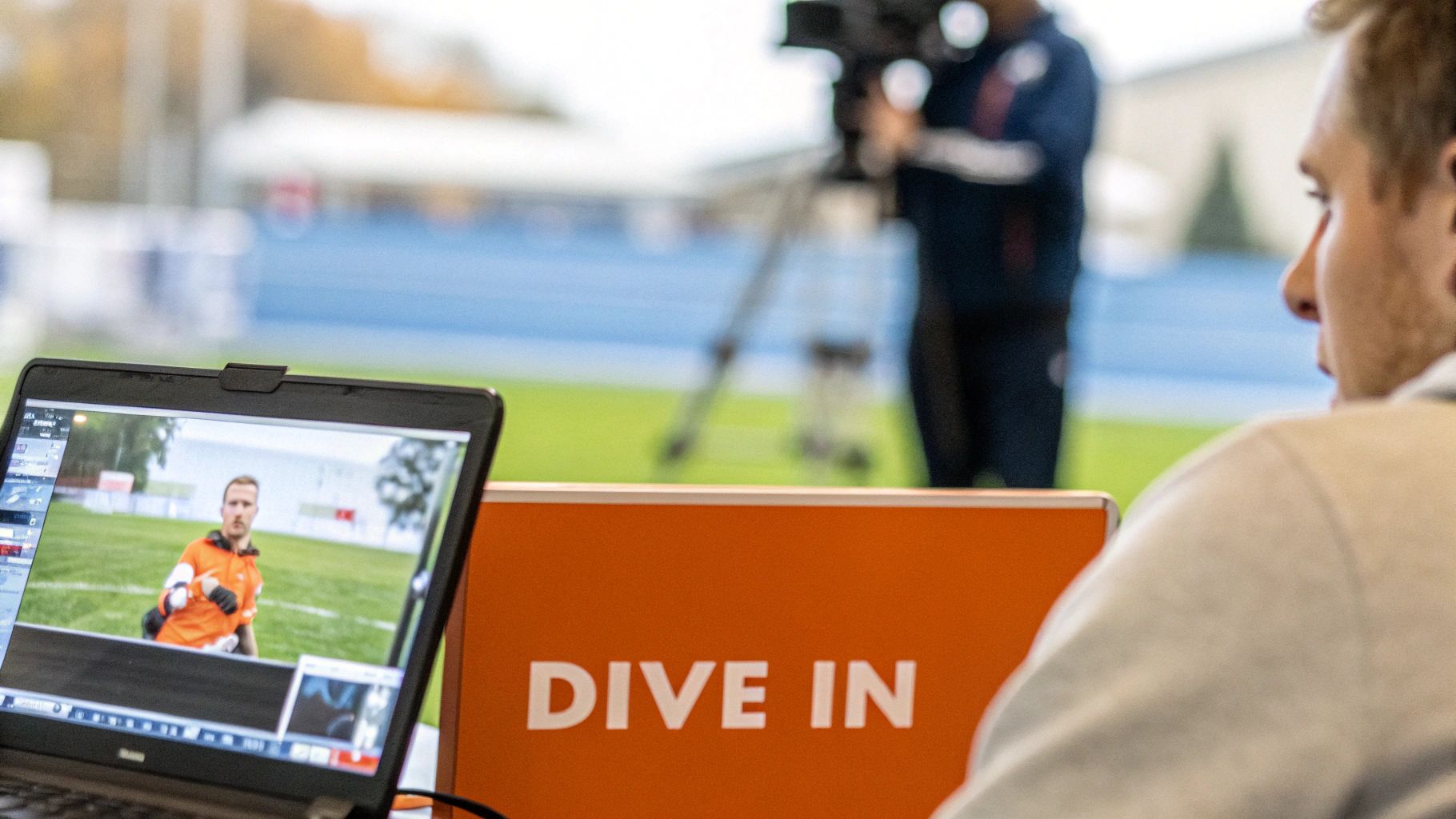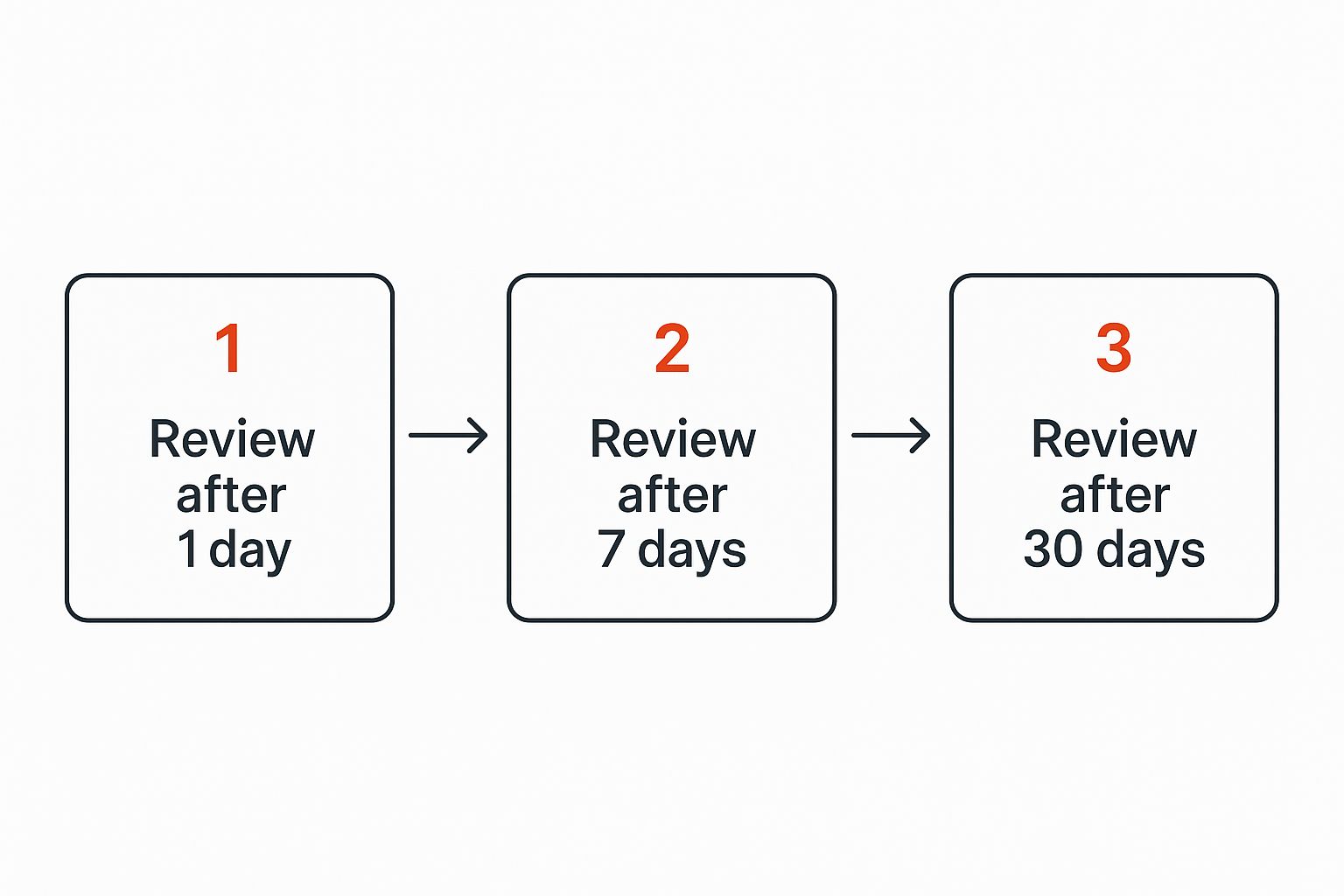How to Learn German Fast and Actually Retain It
Discover how to learn German fast with practical strategies that work. This guide covers smart vocabulary, daily immersion, and structured learning plans.

If you're looking for the secret to learning German fast, it boils down to a smart combination of high-frequency vocabulary, a strategic focus on grammar that actually matters, and daily immersion. This isn't about memorising endless, random word lists. It’s about building a practical foundation for real conversation, right from the very beginning.
Why German Is More Approachable Than You Think

Does the thought of learning German feel a bit daunting? Let’s tackle that misconception head-on. Most people are genuinely surprised when they discover how logical German grammar can be and how much it shares with English. This overlap gives you a massive head start.
This guide isn't about generic tips you've heard a thousand times. It's a practical framework for getting you up to speed, quickly. We'll dive into how to build a solid vocabulary core, create a German-speaking world for yourself without leaving home, and make the most of structured resources. My goal is to show you that fast, real progress isn't just a fantasy—it’s completely achievable with the right strategy.
Shared Roots With English
One of the biggest gifts for English speakers learning German is the sheer number of cognates—words that look, sound, and mean the same thing in both languages. Think about words like Haus (house), Freund (friend), or Information (information). They’re instantly recognisable.
This shared linguistic DNA means you’re not starting from scratch. You already have a built-in vocabulary base, which makes those first few weeks feel a lot less intimidating and much more empowering.
A Supportive Learning Environment
Germany itself fosters a really supportive atmosphere for anyone learning the language. A huge percentage of the population speaks English, so you can handle day-to-day life while you're still getting the hang of German. This is a massive plus for professionals and students. In fact, speaking the local language can be a huge career advantage, especially if you plan to find work in Germany.
By focusing on what you already know and the logical patterns within the language, you can bypass the common frustrations that slow learners down. The goal is to build momentum early and maintain it.
This article will show you exactly how to get there. I'll give you actionable steps to weave German into your everyday life. You'll learn how to:
- Prioritise the most common words and phrases people actually use.
- Use cognates as a shortcut to rapidly expand your vocabulary.
- Create a "German bubble" at home for effortless daily practice.
- Lean on structured learning to fill in the gaps in your knowledge.
With this focused approach, you’ll soon realise that learning German fast is a realistic and incredibly rewarding goal.
Build a Strong Core with Smart Vocabulary and Grammar
If you want to learn German fast, you have to resist the temptation to memorise endless, random word lists. I’ve seen so many beginners fall into this trap. The real key to making quick progress is focusing your energy where it actually delivers results. This means zeroing in on high-frequency vocabulary and getting a solid grasp of core grammar concepts without getting bogged down in the minutiae.
Think of it like this: the Pareto Principle, or the 80/20 rule, is your best friend when learning German. A surprisingly small number of words make up the vast majority of everyday conversations. If you concentrate on the 1,000 to 2,000 most common words, you’ll find you can understand around 80% of most spoken and written German. Forget obscure vocabulary for now; master the words for daily actions, common objects, and simple descriptions first.
This strategic approach gives you a functional foundation from day one, which means you can start trying to communicate almost immediately.
To help you laser-focus your efforts, here’s a breakdown of where to put your energy for the biggest and fastest returns.
High-Impact German Learning Focus Areas
| Focus Area | Strategy | Why It Accelerates Learning |
|---|---|---|
| High-Frequency Words | Use frequency lists (1,000-2,000 words) to build your initial vocabulary base. | You're learning the exact words you'll hear and use most often, instantly boosting comprehension and usability. |
| Cognates | Actively look for words similar in German and English (Hand, Buch, System). | This is the lowest-hanging fruit. It rapidly expands your vocabulary with minimal mental effort. |
| Core Grammar | Focus on noun genders (der, die, das), basic sentence structure, and present tense verbs. | Provides the essential scaffolding to build coherent sentences, making you understood from the start. |
| Spaced Repetition | Use tools like Anki daily to review words and grammar rules at increasing intervals. | Moves information from your short-term to your long-term memory, preventing you from forgetting what you've learned. |
By prioritising these areas, you create a solid, functional framework that you can build upon later, rather than getting stuck on exceptions and complex rules too early.
Prioritise Cognates and Core Grammar
English speakers have a massive head start: cognates. These are words that look and mean the same thing in both languages. Seriously, you already know hundreds of German words without even realising it. Words like der Bruder (the brother), die Hand (the hand), and das Buch (the book) are instantly recognisable. Making a habit of spotting these connections is a brilliant way to expand your word bank with very little effort.
When it comes to grammar, don't try to swallow the whole textbook at once. It’s overwhelming and unnecessary. Just focus on three critical areas to start:
- Noun Genders and Articles: This is non-negotiable. Learn every new noun with its article (der, die, das). It will save you a world of pain later on.
- Basic Sentence Structure: Get a feel for the standard Subject-Verb-Object word order and how it shifts around to form a question.
- Verb Conjugation (Present Tense): Master how to conjugate regular verbs and the big, important irregular ones like sein (to be) and haben (to have).
The goal isn't to achieve perfect grammar overnight. It's about building a solid enough structure to express yourself clearly. You can always come back and refine the complexities later, once you're more comfortable with the language.
For example, simply knowing that the verb almost always takes the second position in a simple German sentence (Ich lerne Deutsch – I learn German) is a high-impact rule that will immediately make your sentences sound more natural.
Anchor Your Knowledge with Spaced Repetition
Learning new words and rules is one thing, but making them stick is another. This is where a Spaced Repetition System (SRS) is an absolute game-changer. I personally swear by tools like Anki, which uses a smart algorithm to show you digital flashcards right before you’re about to forget them. This process is scientifically proven to move information from your short-term to your long-term memory.
It's far more effective than old-school cramming. Short, consistent review sessions every day will cement your knowledge of noun genders, verb conjugations, and that high-frequency vocabulary we talked about.
You can even tailor this to your specific goals. For instance, if you're job hunting, our guide on how to write a German CV has plenty of specialised vocabulary you can add directly to your SRS deck. This kind of targeted practice ensures you're learning what's most relevant to you.
Interestingly, you'll find that Germany's high level of English proficiency is actually a huge asset. With nearly four out of five Germans speaking a foreign language, there's a strong cultural appreciation for language learning. As detailed in a study on English proficiency in Germany on thehistoryofenglish.com, this shared linguistic foundation—especially the similarities between English and German—gives you a great starting point.
Create a German Immersion Bubble at Home

You don't need a plane ticket to Berlin to truly immerse yourself in German. I've seen countless students make incredible progress by creating a rich "immersion bubble" right in their own homes. This is about more than just switching your phone's language settings; it’s about weaving German into the fabric of your daily routine so that constant exposure becomes second nature.
The idea is to shift from passive listening to active engagement. When you surround yourself with the sights and sounds of the language, you’re constantly reinforcing vocabulary and naturally absorbing sentence structures. Your ear becomes attuned to the unique rhythms and intonations of spoken German, which dramatically speeds up the learning process and supports your more formal study sessions.
Curate Your German Media Diet
First things first, let's look at your entertainment. Start swapping out some of your regular English-language content for German alternatives. The key is to find things you actually enjoy, which makes learning feel less like a chore.
Podcasts are a fantastic starting point. If you're just getting your feet wet, Coffee Break German is brilliant because it breaks things down for different levels. For those a bit further along, I always recommend the Easy German podcast. They discuss culture and everyday life in clear, natural conversations.
Streaming services are your best friend here. Platforms like Netflix are packed with excellent German originals. You’ve probably heard of Dark, but also check out shows like How to Sell Drugs Online (Fast). Here’s a little trick I tell all my students for using subtitles effectively:
- For Beginners: Stick with German audio and English subtitles. This lets you follow the plot without getting lost.
- For Intermediates: The magic happens when you switch to German audio with German subtitles. This is a game-changer for connecting the spoken word with its written form.
- For the Advanced: Go for German audio only. It’s a challenge, but it forces you to sharpen your listening comprehension skills.
The screenshot above shows the Deutsche Welle website for "Langsam gesprochene Nachrichten," which translates to "Slowly Spoken News." This is an invaluable resource. It covers current events at a much slower pace, giving your brain the time it needs to process new words and complex sentences without feeling overwhelmed.
Find Authentic Speaking Practice
Listening and reading will build your foundation, but fluency only comes from speaking. I know this can be the most intimidating part, but technology has made it incredibly easy to find people to talk to without ever leaving your house.
Check out platforms like Tandem or HelloTalk. They're designed to connect you with native German speakers who are looking to learn your language. The setup is simple: you arrange a call and spend half the time speaking German and the other half speaking English. It's a fantastic, mutually beneficial way to get real-world practice.
Don't wait until you "feel ready" to start speaking. I promise you, that day will never come. Confidence is built by doing, not by waiting. Stumble through sentences, make plenty of mistakes, and ask for corrections. That is exactly how you learn.
To really dial in your pronunciation inside your immersion bubble, you might also look into tools like Spracherkennung Software. Think of it as a patient, on-demand tutor that gives you instant feedback on how you sound, helping you fine-tune those tricky vowels and consonants.
By building this immersive environment, you turn your home into a language lab. You’ll be genuinely surprised at how quickly your understanding and confidence soar when German is simply a part of your world.
Accelerate Your Progress with Structured Learning

While creating your own immersion bubble at home is a brilliant way to absorb the language, the real secret to moving quickly is pairing it with a structured learning path. A good course gives you something self-study often can’t: a solid framework that ensures you don’t accidentally miss crucial grammar or the subtle context behind the words.
Think of it like this. Immersion is like wandering through a new city on your own, soaking it all in. A structured course is like having a seasoned guide who points out the fastest routes and explains the story behind the landmarks. When you put them together, you have an incredibly powerful learning strategy.
The Power of a Proven Curriculum
A well-designed German course, whether you take it online or in a classroom, gives you a clear roadmap from beginner (A1) all the way to advanced proficiency (C1). This systematic approach is your best defence against hitting those frustrating plateaus where you feel completely stuck.
These programmes are built to add new skills layer by layer. For instance, you’ll get comfortable with basic sentence structures before the course ever asks you to tackle complex subordinate clauses. This logical build-up gives you a strong foundation, which is the key to learning German quickly without feeling overwhelmed.
A structured course answers the "why" behind the language. It decodes the grammatical logic, turning what feels like a list of random rules into a predictable system you can actually use.
This is where Germany's top-tier educational system really shines, offering a huge advantage to anyone learning the language.
Capitalising on Germany’s Educational Ecosystem
Germany has spent decades perfecting how it teaches its language to foreigners. Institutions like language schools and university prep courses, known as Studienkollegs, offer outstanding programmes that are specifically tuned for international students. They create a supportive environment that also pushes you to succeed.
This ecosystem got a massive boost from Germany's own policies. When tuition-free education was introduced in 2014, the number of international students shot up by over 55%, with nearly 470,000 enrolled by the 2023/24 academic year. This flood of new learners has fuelled the development of some of the most effective German courses you can find anywhere.
Because of this well-resourced and competitive environment, you get access to:
- Experienced Instructors: You'll be taught by professionals who are specialists in teaching German as a foreign language (Deutsch als Fremdsprache).
- Peer Motivation: Learning alongside other driven students from all over the world creates an energy you just can't replicate on your own.
- Standardised Levels: Courses are aligned with the Common European Framework of Reference for Languages (CEFR), so you get a clear and globally recognised measure of how far you’ve come.
By blending self-directed immersion with a proven educational programme, you're not just learning—you're learning strategically. It’s also about learning how to study smarter not harder to make the most of your time. This dual approach is what will catapult you from being a hesitant beginner to a confident German speaker.
Your Sample Weekly German Study Plan
Alright, let's turn all this theory into a real, workable plan. Vague goals like "I'll study German more" almost never work. What you need is a clear, actionable schedule you can actually follow. Think of the examples below as a starting point—a template you can tweak to fit your own life and learning style.
The secret ingredient here is consistency, not cramming. Short, focused sessions every day are far more powerful than a heroic, five-hour study marathon on a Sunday. This daily habit is what builds momentum and truly anchors new words and grammar in your long-term memory.
An Intensive Study Schedule Example
This schedule is for someone who's really looking to make rapid progress, putting in about 1.5 to 2 hours each day. It’s intense, but the results can be incredible.
-
Monday:
- Morning (30 mins): Fire up Anki. Run through your existing flashcards and then learn 20 new high-frequency words. Make sure you're learning nouns with their articles!
- Evening (60 mins): Time for grammar. Complete one solid lesson from a structured course, maybe focusing on something tricky like accusative prepositions. Crucially, do every single exercise that comes with it.
-
Tuesday:
- Morning (30 mins): Your daily Anki review. Don't skip it.
- Lunch (15 mins): Pop in your headphones and listen to a beginner-friendly podcast. Something like Coffee Break German is perfect for this.
- Evening (45 mins): Netflix time, but with a purpose. Watch an episode of a German show (like How to Sell Drugs Online (Fast)) with German subtitles. Your mission: find 5-10 new words or phrases you don't know and add them straight to your Anki deck.
-
Wednesday:
- Morning (30 mins): Back to Anki. Review your cards and learn another 20 new words.
- Evening (60 mins): Speaking practice. Get on Tandem for a 30-minute conversation with a language partner. Afterwards, spend the next 30 minutes reviewing the mistakes you made and the new vocabulary you picked up.
This kind of structure ensures you're hitting every key skill—vocabulary, grammar, listening, and speaking—multiple times throughout the week.
A More Relaxed Study Schedule Example
Don't have two hours a day to spare? No problem. You can still make fantastic progress with just 45-60 minutes of focused effort daily.
- Monday: Anki review plus 10 new words (20 mins). Follow that with a focused grammar lesson (25 mins).
- Tuesday: Listen to Langsam gesprochene Nachrichten during your commute (20 mins). Later, watch a German YouTube video on a topic you genuinely find interesting (20 mins).
- Wednesday: Your daily Anki review (15 mins), followed by a quick 15-minute chat with your language partner.
- Thursday: Anki review again (15 mins), then dedicate 30 minutes to drilling grammar exercises.
- Friday: It's "Fun Friday!" Your only task is to enjoy the language. Watch a German film or even play a video game in German for an hour.
The bottom line is this: The best study plan is the one you actually stick with. Whether you go for the intensive or the more relaxed pace, what matters is that you show up every single day, even if it's just for 15 minutes of vocabulary review.
This principle of consistent, structured learning isn't just a hunch; it's how formal education works. In 2023, data showed that 20.9% of lower secondary students across the EU were learning German, a testament to the power of regular, systematic exposure. If you're curious, you can see more about language learning trends in the EU on ec.europa.eu and see how structured pathways lead to real proficiency.
The infographic below really drives home the idea of spaced repetition, which is the engine behind an effective daily study habit.

As you can see, reviewing information at gradually increasing intervals is precisely how you move it from your short-term "cramming" memory into your permanent long-term knowledge base.
Finally, always remember to shape your plan around your personal goals. For example, if your aim is to land a job in Germany, you might dedicate one of your study blocks each week purely to learning career-specific vocabulary. Our guide on German job search websites is a fantastic resource for finding the kind of professional language you'll want to add to your study routine.
Common Questions About Learning German Fast
Even with a rock-solid study plan, hitting a wall or having those nagging questions crop up is completely normal. Honestly, it's part of the process. Knowing how to handle these common hurdles is the secret to staying on track when you're trying to learn German quickly.
Let's tackle some of the most frequent worries I hear from learners.
One of the biggest anxieties is German grammar, especially those notorious noun genders and the case system. It can feel like an impossible mountain to climb at first. My advice? Don't try to memorise endless declension charts.
Instead, focus on learning new nouns with their articles. Treat der, die, or das as part of the word itself. For instance, don't just learn Tisch for table; learn der Tisch. This small mental shift makes the article feel inseparable from the noun, helping you build an intuitive sense for gender over time. It’s far more effective than rote memorisation.
How Do I Know When I'm Ready for the Next Level?
It’s surprisingly easy to get stuck at one proficiency level, especially once things start to feel comfortable. So, how do you know it's time to push forward?
A clear sign is when your current materials feel too easy. If you're breezing through a podcast or TV show and understanding 90-95% of it without breaking a sweat, you're ready for a bigger challenge.
Another key indicator is your ability to express yourself. When you can talk about a topic without constantly grasping for basic vocabulary, you're making real progress. You'll still make mistakes—we all do—but the conversation flows more naturally. Don't wait for perfection.
The goal isn't to eliminate every mistake before advancing. Real growth happens when you deliberately step into situations that are just slightly beyond your comfort zone. That's the sweet spot for learning fast.
Finding Good Conversation Partners
Finding people to practise with can feel like a major hurdle, but it's absolutely vital for fluency. Language exchange apps are a great start, but don't forget to look around your own community.
Search for a German Stammtisch (a regular, informal get-together) in your city. You’d be surprised how many there are, and they’re usually very welcoming to learners.
For those focused on professional growth, try finding partners who share your career interests. This is a fantastic way to practise the specialised vocabulary you'll need at work. It’s particularly valuable for anyone thinking about working in Germany as a foreigner, as you build both language skills and professional connections at the same time.
Ultimately, the best conversation partner is simply someone you enjoy talking to. Consistency comes from genuine connection, not forced practice.
Feeling ready to take the next step in your German career journey? Connect with verified professionals in Germany on iknowly. Get instant 1:1 advice on your CV, interview skills, and career strategy. Start with a trial session today at https://www.iknowly.com.
Need Personal Guidance on Your Career Journey?
Connect with experienced professionals who've successfully navigated this path at top German companies.

